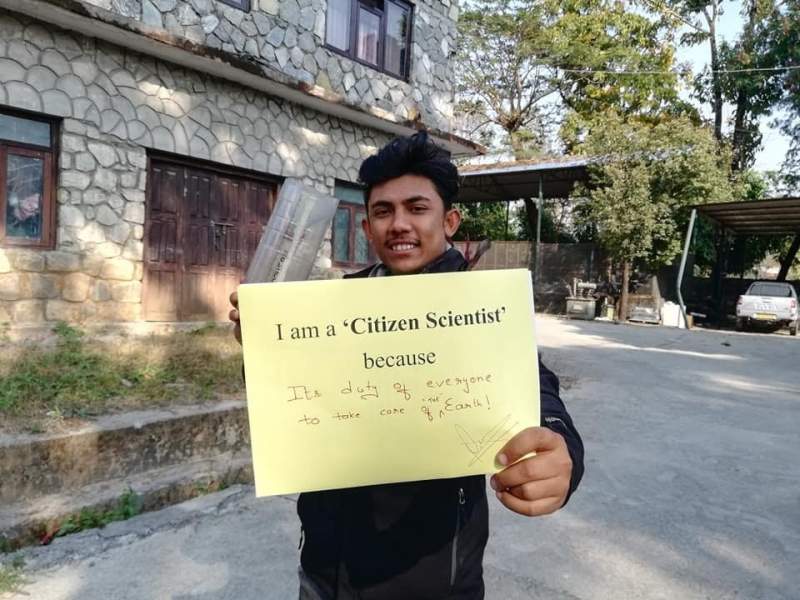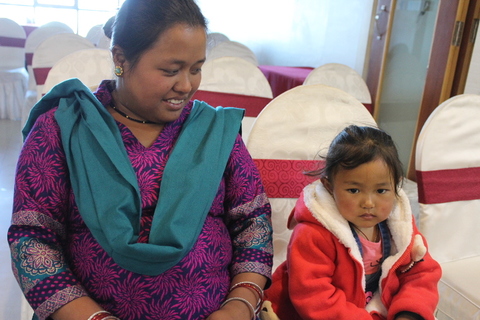Water is one of our most precious and indispensable commodities. Putting our favorite Lord Kelvin phrase into action (‘You can’t manage a resource you don’t measure’), SmartPhones4Water (S4W)-Nepal generates data to support students, researchers and policymakers in making wise water management decisions. Extreme population growth has led to stress on the water resources of the Kathmandu Valley, and the project initiated by S4W-Nepal has the objective of collecting the data necessary to quantify these stresses and inform sustainable water management, so that effective solutions can be developed and implemented. Although we began in the Kathmandu Valley, S4W-Nepal has recently been expanding efforts and data collection into other regions of Nepal as well.
Included below is an interview with Sadam Bala, one of our citizen scientists taking daily precipitation measurements. Each citizen scientist has their own story and unique perspective to share. Let’s see what some of his personal interests, experiences working as a citizen scientist in S4W-Nepal and other thoughts are.

Currently working at Nepal Electrical Authority (NEA) in Pokhara as an Electrical Engineer, Sadam Bala was born and raised in Bhaktapur. He completed his Bachelor’s in Electrical Engineering at the Institute of Engineering (IOE), Pulchowk Campus, which is one of the most prestigious engineering colleges in Nepal. Along with his work, he is currently enrolled in Western Regional Campus in Pokhara, pursuing his Master’s in Distributed Generation. Besides academics and work, his personal interests are travelling to new places and up to now, he has travelled several districts of Bagmati, Gandaki, Dhaulagiri and some parts of the mid and far-western regions of Nepal. He looks forward to continuing to travel and explore new places! He loves exploring and learning about new things and the modern concept of ‘citizen science’ fascinated him and drew him into being a part of S4W-Nepal.
It has been a year since Bala became involved in S4W-Nepal as a citizen scientist taking daily precipitation measurements. He is one of only a few citizen scientists from Pokhara. In his interview, Bala said, ‘Data collection is the basis for scientific research.’ He believes effective and informative research is an outcome of good data, and good data is also the basis for appropriate management of natural resources (including water!) both in the present and looking to the future. He further added, ‘It is not a tough job to take a picture and send data through a mobile application. It only takes a few minutes a day, not at all time consuming’. He feels happy to be able to participate in scientific research with minimal effort. Bala was aware of the importance of the citizen science concept as in his interview he highlighted citizen scientists as a critical part of research. Through S4W-Nepal, he has learned about existing problems and data gaps in the water resources field and how citizen scientists can reduce or eliminate those data gaps.
To his fellow citizen scientists, he conveys a message that these types of projects help an individual learn new and interesting things and can make them aware of existing problems that need to be addressed. Besides, citizen science projects can help built a network among individuals with different experience and backgrounds, which can be crucial in their personal development as well as for overall community or nation-building in the long run. From his personal experience, he suggests that his fellow citizen scientists be dedicated, self-motivated and work selflessly as the work is important and only requires a few minutes each day.
Each day, Sadam Bala uses an Android application called Open Data Kit (ODK) to record rainfall collected by an inexpensive locally made rain gauge (each gauge costs about $1.50 USD). Bala is motivated to participate in the project because he is fascinated by the citizen science concept, and he understands that data collection is a very important part of scientific research. Because of this, he is also eager to participate in large scale data collection in the near future if any opportunities are available.
Citizen science helps ordinary people increase their scientific understanding. All it takes is a smartphone with good GPS, a camera and access to the Internet to deinstitutionalize science and help the inner scientist in all of us grow, learn, and participate in scientific work on a broader scale. It gives every one of us opportunities for better understanding of a variety of subject matters, from water resources to backyard birds to the time of year that flowers are in bloom.
YOU CAN BE A CITIZEN SCIENTIST TOO!!!!
S4W = citizen science + mobile technology + young researchers. Citizen science refers to collaborations between scientists and general people to fill important scientific data gaps and expand the horizon of scientific data collection. S4W-Nepal uses an Android application called Open Data Kit (ODK) for data collection with the help of citizen scientists. The advanced mobile technology with good GPS and camera have improved the reliability and accuracy of citizen science observations. The citizen science approach is very cost effective and rapidly scalable.


